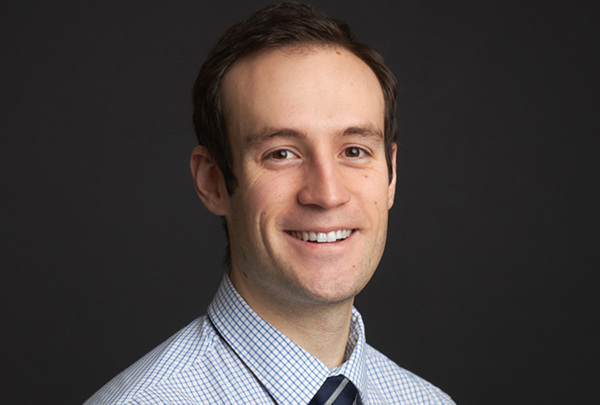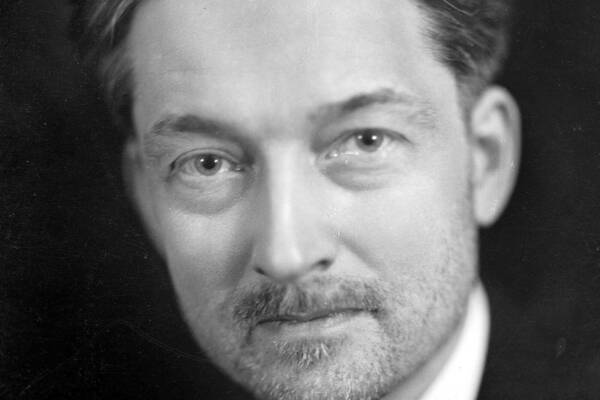Exploring the Maritain papers at Notre Dame: Five questions with Jacob Saliba

Jacob Saliba recently received a Research Travel Grant from the Cushwa Center for his dissertation project, “The Discovery of the Sacred in Interwar France: From Contestation to Cooperation, 1919–1941.” A doctoral candidate at Boston College, Saliba visited the University of Notre Dame in June 2023 to see materials at the Jacques Maritain Center’s collection, which includes papers of Jacques Maritain, Yves René Simon, and Charles de Koninck—materials that have been curated by Kevin Cawley over the past three decades. Shane Ulbrich checked in with Saliba shortly after his visit to Notre Dame.
Shane Ulbrich: We were so glad to hear how worthwhile your visit to see the papers of Jacques Maritain has been. Before we get to that, tell us briefly about your dissertation itself. How do you see it contributing to modern Catholic intellectual history?
Jacob Saliba: Thank you, Shane. I was very glad to have the opportunity to visit the Maritain collections at Notre Dame and most grateful for the very generous support from the Cushwa Center to make this trip possible!
Drawing on recent works by Sarah Shortall (2021), Brenna Moore (2021), Ed Baring (2019), and James Chappel (2018), my dissertation investigates the role of French Catholic thinkers in transforming 20th-century thought and culture. In particular, my dissertation explains how and why mutual intellectual projects and lively community bonds formed between Catholic, Jewish, and secular thinkers between the world wars. The interwar period was quite tumultuous; it saw the rapid rise of fascism, anti-Semitism, and communism. Nevertheless, as my dissertation argues, the looming context of fascism, racism, and extremism in France produced new conditions of possibility for social, cultural, and intellectual transformation. My dissertation focuses on Catholic intellectuals associated with movements of phenomenology (Gabriel Marcel), Hegelianism (Gaston Fessard S.J.), personalism (Emmanuel Mounier), and neo-Thomism (Jacques Maritain) who were all at the forefront of this evolution and who facilitated boundary crossings and renewal with non-Catholic intellectuals amidst the interwar turmoil. This was a powerful moment that saw the religious-secular divide soften and transform in intellectual culture, permitting spaces of interfaith dialogue and cross-cultural exchange to open up.
SU: How did you learn about the Maritain Center’s collection? What made you think it might be a priority for your research?
JS: I learned of the Maritain collections through some conversations with scholars at conferences of the American Catholic Historical Association as well as seeing citations of the collections in historiography. Then, through contact with Kevin Cawley at Notre Dame and navigating for myself the online catalogue of the collection, I realized the incredible breadth, depth, and richness of the material kept at Notre Dame. In fact, I would just add that the online catalogue is itself an incredible resource!
To answer the second part of the question, I have been very intent on pursuing material that could help me reconstruct the events, actions, and ideas of the period in Maritain’s career from the late 1920s into the mid-1940s. As many scholars have convincingly shown, Maritain played a pivotal role in developments of 20th-century philosophy, religious thought, politics, and education. His ideas were dynamic and he enjoyed a very wide readership by many people of diverse backgrounds and intellectual training. His presence as a religious philosopher, public intellectual, and professional educator stretched throughout the world; he himself taught at universities in France, Canada, and the United States. For myself, I had this strong sense that as much scholarship as there was on Maritain’s neo-Thomism, political theory, legal theory, and teaching career, there was still more beneath the surface to be learned and integrated into the scholarly conversation. And, here I just want to briefly add that conversations with–and encouragement by–Stephen Schloesser, S.J., as well as reading Brenna Moore’s Kindred Spirits have really helped me to rethink my approach to make novel discoveries on “older themes.” My intuition on what was “beneath the surface” was certainly confirmed after spending my first of many days at the archive.
SU: How did you navigate the collection of Maritain’s papers? What have been some highlights of what you found?
JS: As a preliminary step, through communication with Kevin Cawley, I was able to orient myself with the online catalogue (which is quite large). Then, just before I arrived to Notre Dame, Kevin kindly organized my requested files into boxes based on themes and dates to match my project goals. This greatly assisted me in having a stream-lined approach to investigating the primary sources; I could move very easily from theme to theme without losing sight of the chronology as well. The Maritain collection had dozens and dozens of files of primary-source material on Maritain’s philosophical work, political action, and professional duties that directly related to my project. Many times, in fact, I discovered trails of information and new dimensions of the plot, so to speak, and would need to request extra sets of files altogether. Kevin not only retrieved these files almost immediately (allowing me to keep a very steady pace with the material) but also gave advice on how to read some of the archival annotations in the documents in order to keep with the trail that I just discovered. This guidance allowed me to focus on which files exactly to pursue in order to recreate the most accurate historical picture.

For example, I was able to triangulate Maritain’s many friendships, political relationships, and philosophical interlocutors in the United States, United Kingdom, Russia, Latin America, and Algeria from his time as president of the École Libre (the “Free French University” affiliated with the New School for Social Research in New York). I had not been aware of all these connections beforehand. The archives included sets of correspondence with figures including Charles de Gaulle, Lord Halifax, and Alvin Johnson (director of the New School for Social Research); detailed meeting notes for the founding of international centers at the École Libre; and drafts of speeches by Maritain about European colonies during and after World War II. These are just a few highlights of what I found. The collections are much deeper and much broader than one would expect, with material ranging across wide international, social, intellectual, and interpersonal spectrums.
SU: Do you think your visit to this collection has affected your approach to the dissertation? If so, how?
JS: My visit to Notre Dame has certainly transformed my dissertation project in many positive ways. Firstly, I was able to examine for myself unpublished letters, documents, and writings that are simply not available otherwise. Secondly, these materials have helped me to build more robust dimensions to my narrative, in many respects, matching up with my findings at other archives that I have visited in France. Thirdly, as a kind of blend of the first and second points, my narrative has evolved. I arrived at the archives with a certain vision and preliminary expectations (based on historiography and other archival work) for my project. After consulting the material at Notre Dame, my narrative not only became thicker with information but also achieved more robust trans-national dimensions. Ultimately, my goal is to tell a complete story, that is, to articulate the full viewpoints between Catholic and non-Catholic intellectuals alike as they crossed boundaries and engaged in dialogue with one another. The Maritain archives are so rich with information and so well preserved that I was able to locate the points of view of other Jewish or secular intellectuals with whom Maritain was in communication. It’s been an incredible experience locating and integrating this information.
SU: How far along are you in the research and writing process and what’s next on your agenda?
JS: I suppose that I am at that stage where I can really sit down and start the dissertation drafting process. With two years left in my doctoral program and with some time to digest archival information, it feels good to finally get underway with writing. I certainly plan on continuing to consult archival sources as the writing process continues, but it feels good to be at the stage of articulation of findings into one unified story. Also, aside from the dissertation, I presented a paper at a conference at Queen’s Mary University in September on French émigrés and intellectual history. In January I will be presenting my research on Jacques Maritain, more specifically, at the American Catholic Historian Association in San Francisco. Lastly, I am actually in the process of putting together an article for an upcoming special issue in U.S. Catholic Historian based on my findings at the Maritain collection regarding his role as president of the École Libre. Overall, from dissertation growth to conferences and a research article, all of this was made possible with a Cushwa grant to visit Notre Dame. I am sincerely grateful to the Cushwa Center for its generosity in support of my project and also to Kevin who was a patient and resourceful guide in the archive itself.
Shane Ulbrich is assistant director at the Cushwa Center for the Study of American Catholicism.
Originally published by at cushwa.nd.edu on November 17, 2023.
Latest Research
- Notre Dame and NSWC Crane announce new educational partnershipNotre Dame Vice President for Research…
- New vector control tool effectively reduces malaria transmission in major clinical trialThe University of Notre Dame and Unitaid have announced that an innovative vector control tool for malaria called a spatial repellent showed a significant impact on reducing malaria infections in a study published in …
- With latest policy consultation, Notre Dame continues ongoing work to inform and support the Philippines’ peace processNotre Dame’s Peace Accords Matrix-Mindanao initiative has made significant strides in supporting the Philippines peace process, marking a critical year of policy impact. The work, which builds upon Notre Dame’s ongoing efforts to support the Colombian peace process through the Peace Accords Matrix, extends Notre Dame’s policy impact to a post-conflict setting in Southeast Asia that can benefit from peacebuilding research insights.
- Cyber SMART welcomes the University of Technology Sydney as its first international siteAt an agreement signing on Tuesday, December 10, 2024, Cyber SMART officially welcomed the University of Technology Sydney (UTS) at its first international site. The ceremony took place at UTS, with Cyber SMART leadership…
- Notre Dame Law School hosts Symposium on the future of the Federal Trade CommissionOn December 6, the Program on Law and Economics hosted a symposium focused on the future of the Federal Trade Commission (FTC). The symposium was organized and moderated by Professor Avishalom…
- Notre Dame graduate students win grants for time on Keck TelescopeTwo University of Notre Dame graduate students — Pranav Nalamwar and Alex Thomas — have each won a Keck grant, which includes access to the W. M. Keck Observatory’s Keck Telescope for two nights. The Keck Observatory telescopes,…













